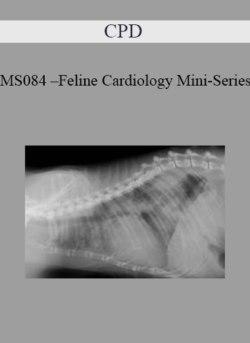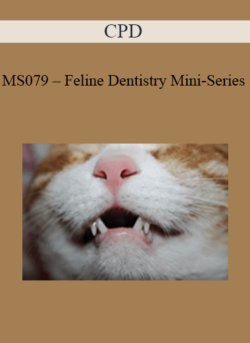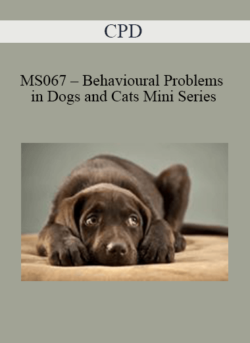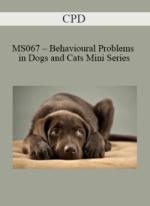[Pre-Order] – Deliver digital download link within 4-8 business days after successful payment. Please contact us to get more details. Purchase CPD – MS067 – Behavioural Problems in Dogs and Cats Mini Series courses at here with PRICE $479 $114MS067 – Behavioural Problems in Dogs and Cats Mini Series£227.00 (+VAT)12 months access to recordings and course materials is included. Please note that these are webinar recordings and not live events. Full details on how to access the Mini Series will be emailed to you.Find out everything you need to know about the three COMMONEST and MOST UNDERDIAGNOSED behavioural problems in dogs and cats!Behavioural problems are common in pets, but attention is most often paid to aggression and separation anxiety. These are also difficult and risky problems to treat in general practice. However, three other problems are not only more common but also under diagnosed in general practice. These represent a genuine opportunity to offer new services to veterinary clients and improve the wellbeing of patients. Each session of this course will comprise two components; a section on case detection and the basis of the problem, followed by a section on treatment and prevention.This Mini Series is suitable for veterinary nurses (vets are welcome too!). Join behaviour specialist Jon Bowen BVetMed DipAS(CABC) MRCVS for three 2-hour sessionsEssential practical tips from our expert tutorComprehensive notes to downloadSelf-assessment quizzes to ‘release’ your 8 hours CPD certification (don’t worry, you can take them more than once if you don’t quite hit the mark first time)12 Months access to recorded sessionsSuperb value for money – learn without traffic jams or rota hasslesThis Mini Series was originally broadcast in August 2014 ProgrammeSession 1Canine Cognitive Dysfunction The prevalence of Canine Cognitive Dysfunction is 14% in dogs over 8 years of age, with 25% of 12-14 year old dogs being affected. However, only 10% receive a veterinary diagnosis and a quarter of owners of severely impaired dogs don’t realise their pet has a problem.This session will cover:How do we make owners aware that their dog needs help: The use of screening tools, such as online questionnaires, to help detect cases of CCDAre all dogs with CCD the same: assessing severity of the problem: How to assess the severity of a problem and identify the best treatmentsDoes CCD increase the risk of euthanasia or abandonment of aged dogs, and do changes in the owner-dog bond increase the risk of CCD: The impact of age and CCD on the owner-dog bondHow are signs of CCD affected by other age-related health problems: How to take a holistic approach to the wellbeing of elderly dogsWhat changes are responsible for dogs showing signs of dementia: The biological basis of CCDTreatment of CCD, including modification to the diet, physical and social environment, as well as drug treatment Session 2Fear of Loud Noises in DogsAround 50% of dogs suffer some degree of fear of loud noises, but few are ever assessed or offered the treatment they need.This session will cover:How do we make owners aware that their dog needs help: The use of screening tools, such as online questionnaires, to help detect cases of noise fear in dogsAre all dogs that are afraid of loud noises affected in the same way: How to differentiate between mild, moderate and severe problems, and identify the dogs that are genuinely phobic and not just afraid of loud noisesWhy do some dogs develop a fear of loud noises: Current evidence on demographics of noise fears in dogs and how to prevent noise fearsDoes fear of noises change over time: How generalisation and conditioned associations lead to worsening problems in fearful dogsTreatment of noise fears in dogs, including behavioural therapy, environmental modification, how owners should react, nutraceuticals and drugs (short term and long term) Session 3Inter-Cat Conflict Between Resident Cats20% of multi-cat owners report that one of their cats is injured in a fight between their cats at least once a year, with 5% of cats of cats having fights that require veterinary treatment. There is a significant correlation between fights between resident cats and health problems such as skin, respiratory and eye disease.This session will cover:How to detect inter-cat conflict before problems get serious: Use of questionnaires and simple stress scoring systemsWhy do domestic cats conflict with each other: The natural order of feline society and how it is constrained by domestic livingDoes inter-cat conflict in the household affect the welfare of pet cats: Evidence for the health impact of conflictHow does inter-cat conflict affect the owner: What happens when conflict leads to spraying, injuries and destructivenessPrevention of problems: how many cats to keep, what mix of ages and sexes works best, and how to introduce new cats to a householdTreatment of inter-cat conflict, including environmental modification, pheromones and medication. Course Feedback:“Excellent Mini Series, really enjoyed it, and especially looking forward to using all the client handouts and information sheets for each section which have been provided”“It was practical and enthusing. I now definitely have a better understanding of cat behavior and canine cognitive dysfunction”“Excellent background information on cat behavior rather just focusing on one aspect. Can apply information to a range of cat related behavioral problems”Salepage: https://cpd-solutions.com/store/product/ms067-behavioural-problems-in-dogs-and-cats-mini-series/Archive: https://archive.ph/wip/6hYPJPurchase CPD – MS067 – Behavioural Problems in Dogs and Cats Mini Series courses at here with PRICE $479 $114
 CPD – MS084 – Feline Cardiology Mini-Series
₹18,924.00
CPD – MS084 – Feline Cardiology Mini-Series
₹18,924.00
 CPD – MS079 – Feline Dentistry Mini-Series
₹18,924.00
CPD – MS079 – Feline Dentistry Mini-Series
₹18,924.00
CPD – MS067 – Behavioural Problems in Dogs and Cats Mini Series
₹18,924.00






